Recent News

YASMINE RADWAN RECEIVED NSF INTERN SUPPLEMENTAL FUNDING
Yasmine Radwan has received NSF INTERN supplemental funding to Dr. Kirill Afonin’s NSF grant that will support her six month internship at MIMETAS. This opportunity will augment Yasmine’s research assistantship in the Afonin Lab with non-academic research internship training opportunities that will complement her academic research training.
This funding provides her with financial support of $55,00 that will be used to support travel, tuition and fees, health insurance, additional stipend and temporary relocation costs. This funding opportunity will allow her to acquire professional development experience that will enhance her preparation for multiple career pathways after graduation. Congratulations to Yasmine Radwan and Dr. Kirill Afonin!
Read more about the NSF INTERN supplemental funding.

RUBY MANDERNA AWARDED MoISSI FELLOWSHIP
Ruby Manderna has been awarded a highly competitive Molecular Sciences Software Institute (MolSSI) Software Fellowship to promote the development of software infrastructure, middleware, and frameworks for broader impact in the field of computational molecular sciences, quantum chemistry, and materials science. Ruby was chosen for this prestigious fellowship on the basis of an outstanding research proposal, which integrates scientific and software development goals, and a review of her significant contributions and productivity in the field of open-source software development. This fellowship provides her with financial support of $40,000 stipend for one year beginning in July of 2024 covering the tuition and required fees for the award year allowing her to pursue cutting-edge research and professional development opportunities. This award not only honors her past achievements but also paves the way for a promising and impactful future. Congratulations to Ruby on this well-deserved honor!
Read more about the fellowship.

YELIXZA AVILA: FROM FIRST-GEN TO POSTDOC
In March 2024, Avila was selected as an iCURE scholar for a postdoctoral fellowship with the National Cancer Institute. iCURE is an extension of the NCI Center to Reduce Cancer Health Disparities highly competitive and successful extramural Continuing Umbrella of Research Experiences training program. CURE supports the career progression of scholars working toward research independence and fosters diversity in the biomedical research pipeline.
It also offers three-year awards for postdoctoral fellows and provides opportunities to work closely with world-class researchers at the National Cancer Institute. Awardees receive support from NCI program staff, access to resources on intramural and extramural funding opportunities, opportunities for professional and career development activities, and connections to an extensive mentoring network. Avila also will receive a stipend as a first-year iCURE postdoc scholar.
Read more about Yelixza’s story.

JORDAN POLER AWARDED NCINNOVATION GRANT
Jordan Poler, professor of chemistry, has been awarded a grant through a pilot program from NCInnovation. He is one of two UNC Charlotte faculty selected for the funding and among eight researchers chosen from the UNC System.
The grant will allow Poler to expand on his team’s recent innovations in water purification that have led to the creation of patented materials capable of removing harmful compounds more effectively than current market solutions.
At UNC Charlotte, Poler leads a research group that includes students from various disciplines focused on the development of advanced materials.
Poler founded startup naneXPure LLC and will work with Goulston Technologies, based in Monroe, to scale up the drinking water purification materials from bench to industry scale. Poler’s research on water purification materials, which includes the synthesis of polyelectrolytes, novel coordination complexes and nanostructured materials, shows the potential of nanoscale science to create impactful, real-world solutions to improve public health, he said.
Poler, a Fulbright scholar, has previously received grants from the Environmental Protection Agency, the National Science Foundation and the Department of Defense for his research on water purification.
Read more about the grants awarded to UNC Charlotte researchers.

WALTER AND HANNA RECEIVED NSF GRANT
The grant will support a collaboration involving both UNC Charlotte and Winthrop researchers to explore photocatalysis with thiazolothiazoles. Photocatalysis is one of the most active areas of development in synthetic chemistry and pharmaceutical development, but much of the field has relied on scarce elements for the catalyst itself. This new research program will develop photocatalytic systems based on more sustainable practices, while also strengthening the connection between the two chemistry departments. Read more about the award: “Exploration and Development of High Performance Thiazolothiazole Photocatalysts for Innovating Light-Driven Organic Transformations.”
News
UNC Charlotte broke ground for a new science building that will reshape the way sciences are taught at UNC Charlotte. Set to be opened in 2021, the 130,000 square foot bulding will host both classrooms and laboratories. The building has been designed for interdisciplinary research and collaboration. “This one-stop-shop for our chemistry, biology and physics […]
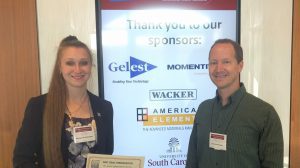
Margaret Kocherga, a 3rd year graduate student in the Nanoscale Science Ph.D. program, received the award for best oral presentation by a student at the 50th North American Silicon Symposium in Columbia, SC on May 15th, 2019. The North American Silicon Symposium brings together individuals from industry and academia to celebrate innovation in silicon chemistry. […]
Priya Vadarevu wins Thomas L. Reynolds Graduate Research Award. This Reynolds Fellowship assists with the costs that are overlooked in other funding sources and to help students stay focused on their research goals. More information about the award can be found here. Priya currently works with Dr. Vivero-Escoto.
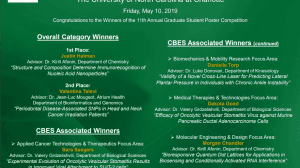
Justin Halman was the 1st place overall category winner with his poster “Structure and Composition Determine Immunorecognition of Nucleic Acid Nanoparticles” at the Charlotte Biomedical Engineering and Science (CBES) 11th Annual Graduate Student Poster Competition. Morgan Chandler with her poster “Molecular Engineering & Design Focus Area” was a CBES associated winner. Both Justin and Morgan […]

Beth Scarbrough received an Honorable Mention in the 2019 National Science Foundation’s (NSF) Graduate Research Fellowship Program (GRFP). This prestigious, highly competitive program supports exceptional graduate students pursing research in STEM. Beth is a second year PhD student at UNC-Charlotte and focuses on life at the nanoscale. Her graduate studies address key questions regarding the […]
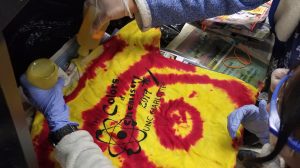
UNC Charlotte held the annual Colors of Chemistry day-long program where children from a variety of schools were able to participate in hands-on activities, including colorful slime, colorful lather printing, and the M&M color wheel. A demonstration show and t-shirt tie dying ended the exciting day. Thank you to Morgan Chandler, Margaret Kocherga, Nickolas Sayresmith, […]
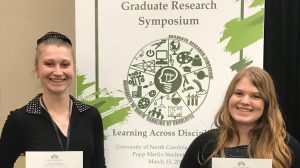
Congratulations to Nanoscale Science students Margaret Kocherga and Morgan Chandler for winning 1st and 2nd at the 19th Annual Graduate Research Symposium. To see all the award winners, click here. Margaret Kocherga’s oral presentation on “New Materials for Organic Electronics” won 1st place in the Liberal Arts & Sciences division of the conference. Margaret works […]
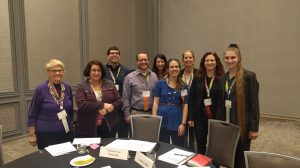
Ms. Margaret Kocherga, a Ph.D candidate in the Nanoscale Science program at UNC Charlotte, is the recipient of the Younger Chemist Committee (YCC) of the American Chemical Society (ACS), Leadership Development Award. This award supported her participation in the YCC Leadership Development Workshop held in Atlanta, Georgia in January of this year. Her contributions, volunteer […]

Why should you join the Nanoscale Science Ph.D. program? Ask our students! “For me, the Nanoscale Science PhD program provided as diverse a PhD as you are willing to try. In this program I was able to get outside of my comfort zone and learn how physicists, engineers, chemists, and biologists solve problems and utilize […]
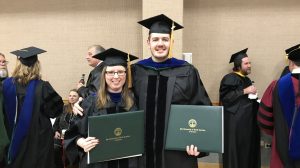
Zachary Lyles and Katelyn Erickson both have successfully defended their theses to their committees and have graduated the Nanoscale Science Ph.D. program! We wish them well on their new lives as Dr.’s of Nanoscale Science. To learn more about Zach’s research, please click here. To learn more about Kate’s research, please click here.
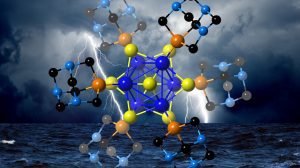
Metal sulfide clusters are attractive components for flow batteries owing to the abundance of their constituent atoms and their tunable size, solubility, and redox properties. Here, we demonstrate that we can prepare an atomically precise cobalt sulfide cluster in a single step using low-cost precursors and water solubilizing phosphine ligands. The resulting cluster undergoes two […]
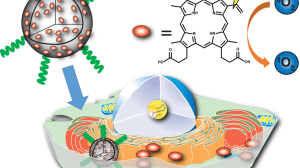
The overall goal of this project is to develop novel biodegradable multifunctional hybrid polysilsesquioxane nanoparticles to carry photosensitizing agents. By fine tuning the chemical features of polysilsesquioxane nanoparticles, the degradability of these materials under specific conditions and their interaction with mammalian cells can be controlled. The success of the proposed work will open new synthetic […]

Amanda Reid has received the prestigious Ruth L. Kirschstein National Research Service Award Individual Predoctoral Fellowship (F31) from NIH. Here is an excerpt from her fellowship “Alternative therapeutic targets have become a major topic in research with growing concerns over the alarming rate of antibacterial resistance. In contrast, many symbiotic bacteria that aid in human […]
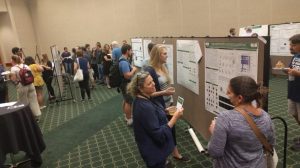
The Association of Nanoscale Science Graduate Students hosted its first annual poster session. Continuing Nanoscale Science and Chemistry graduate students, as well as faculty, presented posters designed to showcase the different areas of science currently being researched at the university.

Margaret Kocherga received an Honorable Mention in the 2018 National Science Foundation’s (NSF) Graduate Research Fellowship Program (GRFP). The program recruits high-potential, early-career scientists and engineers and supports their graduate research training in science, technology, engineering, and mathematics (STEM) fields. Margaret is a Ph.D. student in Nanoscale Science at UNC Charlotte. Her research is in […]
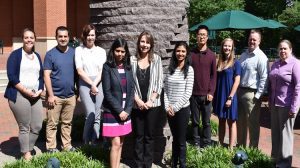
Mubin Tarannum and Katelyn Erickson Win Graduate School Fellowships Mubin Tarannum wins Reynolds Research Award Mubin Tarannum is one of nine Ph.D. students at UNC Charlotte to win the Reynolds Research fellowship award. Her project involves testing a procedure for pancreatic cancer therapy using mesoporous silica nanoparticles to break down barriers to treatment. Mubin currently […]
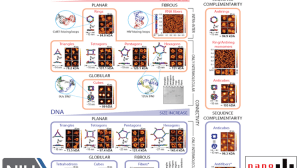
Dr. Afonin has recently been awarded an R01 grant from the NIH. This grant will help his lab pursue the study of the characterization of various multifunctional nucleic acid nanoparticles and understand their immunotoxicity and immunogenicity. More information can be found here.
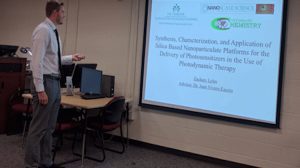
This Fellowship program provides stipend support for master’s and doctoral students to engage in thesis and dissertation-related research during the summer (May 21-August 10, 2018) under the guidance of their advisor. To be eligible, students must be enrolled in one of the College’s thesis or dissertation-based graduate programs and be in good academic standing. They […]